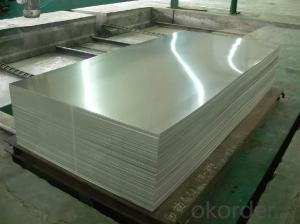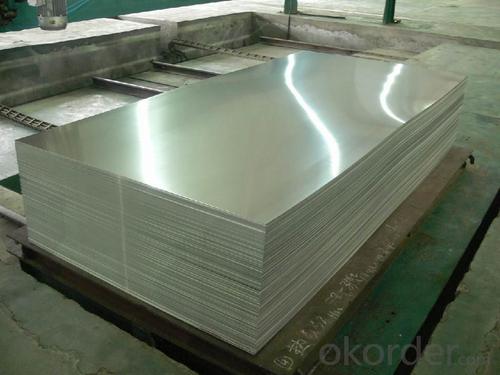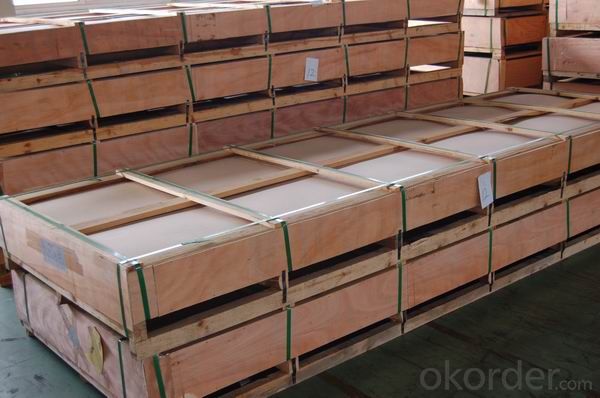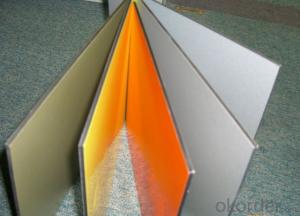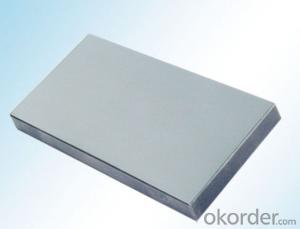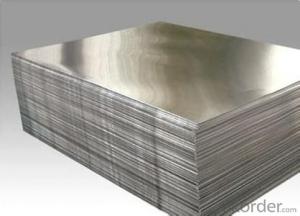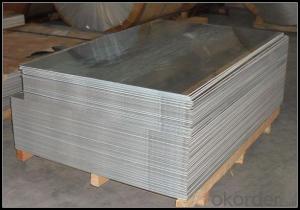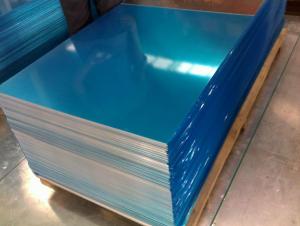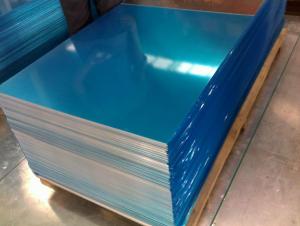Gray Sheets Aluminum 5xxx Mill Finished
- Loading Port:
- China Main Port
- Payment Terms:
- TT or LC
- Min Order Qty:
- 8 m.t.
- Supply Capability:
- 100000 m.t./month
OKorder Service Pledge
OKorder Financial Service
You Might Also Like
1.Structure of Aluminum Sheets 5XXX Mill Finished Description
Aluminum Sheets 5XXX Mill Finished is cut from aluminum coils 5xxx. It has great ductility, heat conductivity, anti-corrosion and moisture resistance properties.
Aluminum Sheets 5XXX Mill Finished is widely used for electronics, instruments, house decoration, sandwich panel.
2.Main Features of Aluminum Sheets 5XXX Mill Finished
• Superior quality of raw material
• Reasonable and stable chemical composition
• Accurate tolerance
• Goode mechanical property
3.Aluminum Sheets 5XXX Mill Finished Images
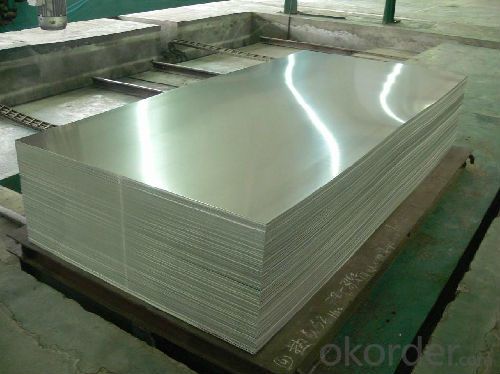
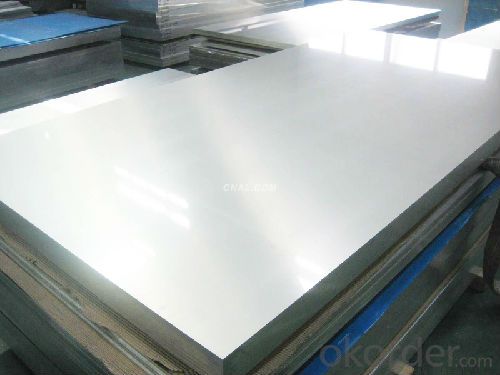
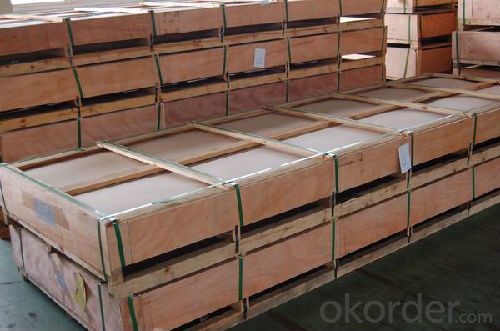
4.Aluminum Sheets 5XXX Mill Finished Specification
Alloy | AA5xxx (AA5052,AA5083,AA5754 etc.) |
Temper | H14, H16, H18, H22, H24, H26, H32, O/F |
Thickness | 0.2mm -- 100mm |
Width | 30mm -- 1700mm |
Standard | GB/T 3880-2006,EN,ASTM,JIS |
5. FAQ of Aluminum Sheets 1xxx C.C Quality
A.How to guarantee the quality?
Customers are welcome to our mill to visit and check the products. Besides, we can arrange a third party to test the Aluminum Sheets 5XXX Mill Finished products.
B.When will you deliver the products?
The Aluminum Sheets 5XXX Mill Finished will be delivered within 35 days after receiving advanced payment or original L/C.
- Q: how many protons,nuetrons, and electrons are in aluminum?
- Aluminum is element 13, so it has 13 protons. This also means that it normally has 13 electrons (provided it is not in an ionic state). Normally it has 14 neutrons, but may have less or more in various isotopes.
- Q: What are the dimensions of 101 aluminum sheets?
- The specific requirements or specifications can cause variations in the dimensions of 101 aluminum sheets. Typically, aluminum sheets are available in standard sizes and thicknesses, such as 4 feet by 8 feet or 3 feet by 10 feet, with thicknesses ranging from 0.02 inches to 0.25 inches. It is worth noting that individual needs and preferences can also result in obtaining custom sizes and thicknesses.
- Q: or aluminum ? and what other gases are released?
- Aluminium does not normally react with water because of a surface coating of the highly unreactive Al2O3 that forms on exposure to atmospheric oxygen. In the presence of strong base, however, this compound dissolves due to complexation by hydroxide, similarly to how silver chloride dissolves in ammonia. Al2O3(s) + 2OH-(aq) + 3H2O(l) ----- 2[Al(OH)4]-(aq) Once this has occured, aluminium metal, a very strong reducing agent, is exposed to water. 2Al(s) + 6H+(aq) ----- 2Al3+(aq) + 3H2(g) Even though the solution is alkaline, there is still a low concentration of H+ formed by the autoprotolytic dissociation of water. The Al3+ formed then reacts with hydroxide to produce more [Al(OH)4]-. Yes, the hydrogen gas is from the water.
- Q: Can aluminum sheets be used for boat building?
- Yes, aluminum sheets can be used for boat building. Aluminum is a popular material choice due to its strength, durability, and resistance to corrosion. It is lightweight and easy to work with, making it suitable for constructing various types of boats. Additionally, aluminum boats are known for their longevity and low maintenance requirements.
- Q: Can aluminum sheets be easily bent or shaped?
- Yes, aluminum sheets can be easily bent or shaped due to their malleability. Aluminum is a soft and lightweight metal that possesses excellent formability characteristics, making it highly suitable for various shaping processes. It can be easily bent, folded, or formed into different shapes using a variety of techniques such as press braking, roll forming, or stretch forming. The malleability of aluminum allows it to be easily molded into intricate shapes without cracking or breaking. Additionally, aluminum's low melting point makes it possible to heat and shape it further using processes like hot bending or thermoforming. Overall, aluminum sheets offer great flexibility and ease of shaping, making them a popular choice in industries such as automotive, aerospace, construction, and manufacturing.
- Q: What is the typical tensile strength of aluminum sheets?
- The typical tensile strength of aluminum sheets can vary depending on the specific grade or alloy being used. Generally, the tensile strength of aluminum sheets ranges from 20,000 to 50,000 pounds per square inch (psi). However, it is important to note that this is a broad range, and the exact tensile strength can be influenced by factors such as the thickness of the sheet, the manufacturing process, and any additional treatments or coatings applied to the aluminum. Therefore, it is recommended to consult the specifications provided by the manufacturer or supplier for accurate information on the tensile strength of a specific aluminum sheet.
- Q: What are the different types of surface treatments available for marine-grade aluminum sheets?
- There are several types of surface treatments available for marine-grade aluminum sheets, including anodizing, powder coating, and painting. Anodizing involves creating a protective oxide layer on the surface of the aluminum, which enhances its corrosion resistance. Powder coating involves applying a dry powder to the surface, which is then heated to form a durable and protective coating. Painting is another option, where a layer of paint is applied to the aluminum surface to provide both aesthetic appeal and protection against corrosion.
- Q: What oil does the aluminum plate stretch with?
- There are professional tensile oil, you can ask to pull the rice cooker liner manufacturers know, if not a lot of production, you can use peanut oil first try, the effect barely enough!
- Q: Are aluminum sheets suitable for electrical connectors?
- Indeed, electrical connectors can be effectively made using aluminum sheets. Aluminium, being a metal with high conductivity, is an ideal option for facilitating the flow of electric current. Its low electrical resistance enables the efficient transmission of electricity. Moreover, aluminum is renowned for its lightweight properties, resistance to corrosion, and affordability, rendering it a favored choice for electrical connectors across diverse sectors like automotive, aerospace, and electronics. Nevertheless, it should be emphasized that when aluminum connectors are utilized alongside dissimilar metals, extra precautions might be necessary to avert the occurrence of galvanic corrosion.
- Q: Are aluminum sheets suitable for high-temperature applications?
- Aluminum sheets are generally not suitable for high-temperature applications. While aluminum has a relatively high melting point of 660.3°C (1220.5°F), its strength and mechanical properties significantly decrease as the temperature rises. At elevated temperatures, aluminum tends to soften, deform, and lose its structural integrity. Additionally, aluminum has a relatively low thermal conductivity, which means it does not efficiently conduct heat away from the source, leading to potential overheating issues. Therefore, for high-temperature applications, materials such as stainless steel or refractory metals like titanium or tungsten are more commonly used due to their superior high-temperature performance and thermal conductivity.
Send your message to us
Gray Sheets Aluminum 5xxx Mill Finished
- Loading Port:
- China Main Port
- Payment Terms:
- TT or LC
- Min Order Qty:
- 8 m.t.
- Supply Capability:
- 100000 m.t./month
OKorder Service Pledge
OKorder Financial Service
Similar products
Hot products
Hot Searches
Related keywords
